

COVID-19.
The world has recorded 5 million COVID-19 deaths, but the real toll is likely more than double that. Nearly two years into a pandemic that continues to rage, the world has now reported its 5 millionth COVID-19 death, according to a count of global deaths maintained by Johns Hopkins University.

That figure is almost equivalent to the total population of New Zealand. On average, more than 7,000 people are reported as dying of COVID-19 each day. Since April 2020, the number of daily deaths has dropped below 4,000 fewer than 20 times. But official figures reported by national governments fail to capture the true toll of the COVID-19 pandemic. Firstly, for every official COVID death there are many more people who have grieved loved ones, been struck seriously ill themselves, or suffered the effects of long COVID. And the official death toll itself is likely to be vastly underestimated.
Professor Alan Lopez, a leading international expert on disease burden and health statistics, believes 5 million is a very inaccurate count of the pandemic's death toll. Another way to measure deaths. The coronavirus is here to stay — here’s what that means. For much of the past year, life in Western Australia has been coronavirus-free.
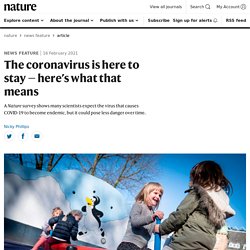
Friends gathered in pubs; people kissed and hugged their relatives; children went to school without temperature checks or wearing masks. The state maintained this enviable position only by placing heavy restrictions on travel and imposing lockdowns — some regions entered a snap lockdown at the beginning of the year after a security guard at a hotel where visitors were quarantined tested positive for the virus. But the experience in Western Australia has provided a glimpse into a life free from the SARS-CoV-2 coronavirus. If other regions, aided by vaccines, aimed for a similar zero-COVID strategy, then could the world hope to rid itself of the virus?
It’s a beautiful dream but most scientists think it’s improbable. “Eradicating this virus right now from the world is a lot like trying to plan the construction of a stepping-stone pathway to the Moon. Childhood virus Vaccines and herd immunity Similar to flu? COVID-19 warnings were ignored, independent review of global response finds. An independent panel set up to review the global response to the coronavirus pandemic has found a litany of failures led to the disaster and warned another catastrophic pandemic may happen unless "urgent and vital" steps are taken.
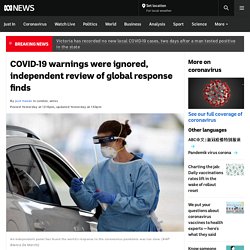
Key points: The independent panel of experts found the global response to COVID-19 had "weak links at every point in the chain"It called for bold reforms of the World Health Organization and national preparedness plans to avoid another "toxic cocktail"The panel's findings will be debated by health ministers at the WHO global assembly later this month In damning findings released on Wednesday, the Independent Panel for Pandemic Preparedness and Response said it found "weak links at every point in the chain" and global political leadership was "absent". As UK COVID variant spreads, Australia urgently needs more purpose-built quarantine stations, experts say. With yet another cluster of people in hotel quarantine this week testing positive for COVID-19 — this time triggering a mass evacuation of Brisbane's Hotel Grand Chancellor — epidemiologists are calling on the Government to urgently establish more purpose-built quarantine stations like the Northern Territory's Howard Springs, pointing to features like its well-spaced rooms, fresh air and staffing arrangements as a crucial line of defence against outbreaks.
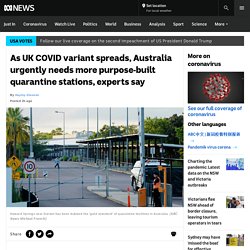
For months experts have been warning of the difficulties with hotel quarantine programs, with some arguing returning travellers should not be triaged in cities because of the risk of the virus escaping, as it has done in South Australia, New South Wales, Queensland and, most catastrophically, Victoria. For that reason Australia's quarantine outfits must swiftly be reviewed and if necessary improved, Professor Blakely said, ideally by an independent agency: "We do not actually know what is happening in quarantine around Australia. " Are there adverse effects of too much hand sanitiser use during the coronavirus pandemic? It's at the front of every business and most of us are probably still carrying a small bottle of it with us everywhere, but could there be a downside to using so much hand sanitiser?
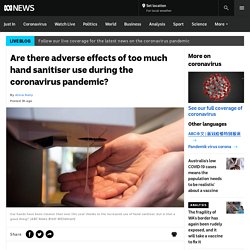
On advice from the nation's medical experts, Australians have been vigorously rubbing the mixture of alcohol and glycerine over our hands since the coronavirus pandemic was declared at the start of 2020. Because, when we are away from soap and water, hand sanitiser is the best way to stop the spread of bacteria, disease and viruses. So, what do dermatologists have to say about the popularity and use of so much sanitiser? We've got all their professional guidance right here. Using lots of hand sanitiser won't reduce your immunity to infections May as well start with the biggest question of them all. Washing your hands more than normal isn't going to make you any sicker than you might usually be. "It's not absorbed through your skin to any degree at all, so there's no risk there either.
19 and pollution: 'Delhi staring at coronavirus disaster' Michael O'Brien's no-confidence motion against 'dangerous' Daniel Andrews fails, Victorian COVID-19 inquiry extended - ABC News. The Victorian Opposition Leader has labelled Premier Daniel Andrews "dangerous and arrogant" during a failed bid to oust him from office with a no-confidence motion in Parliament.

Key points: A no-confidence motion brought against Victorian Premier Daniel Andrews has been easily defeated in State ParliamentVictorian Opposition leader Michael O'Brien brought the motion forward and labelled the Andrews Government "a danger to Victorians"Mr O'Brien accused the Government of a "litany of lies" during a scathing speech Michael O'Brien's move was labelled a "stunt" by Mr Andrews, and was easily defeated 44-23 during a marathon sitting of Parliament that stretched to 9:00pm. The Opposition can only introduce one no–confidence motion of this kind in a parliamentary term, and it was doomed to fail due to Labor's strong majority in the Lower House.
"It's quite clear that a lot of Labor MPs are privately very, very critical of the Government," he said. Cannabis resin now 25% more potent, global study reveals. Cannabis resin – or “hash” – has increased in strength by nearly 25% over the past half century, a major international study has revealed.
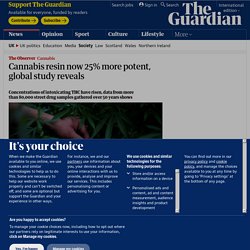
Researchers with the Addiction and Mental Health Group at the University of Bath analysed data from more than 80,000 cannabis street samples tested in the past 50 years in the US, UK, Netherlands, France, Denmark, Italy and New Zealand. Their findings, published in the journal Addiction, reveal concentrations of THC – the intoxicating component of cannabis responsible for giving users a “high” – have changed over time. In herbal cannabis, THC concentrations increased by 14% between 1970 and 2017. This was primarily due to a rising market share of stronger varieties, such as sinsemilla. Concentrations in cannabis resin, which is extracted from herbal cannabis, increased by 24% between 1975 and 2017.
Doctors say Trump takes steroid dexamethasone after oxygen dip. The medical team treating Donald Trump, who tested positive for the novel coronavirus on Thursday, has said the president has “continued to improve” and could return to the White House as soon as Monday while adding he had been given oxygen and the steroid dexamethasone after his blood oxygen level dipped in recent days.

The medical team addressed reporters on Sunday from Walter Reed National Military Medical Center, where Trump was hospitalised on Friday following the diagnosis, which came just more than a month before the presidential election on November 3. “Since we spoke last, the president has continued to improve. As with any illness, there are frequent ups and downs over the course,” Trump’s physician Dr Sean Conley said. Conley said Trump received supplemental oxygen at the White House when his blood oxygen level dipped before being transported to the hospital.
Strategic intelligence: COVID-19. I explain what level 2 of NZ's #Covid_19 Alert System is in my latest @TheSpinoffTV piece. In her briefing @jacindaardern listed what we all SHOULD do now. I need you to understand that you MUST do them otherwise we'll be at level 4 before we know it. How to Flatten the Curve on Coronavirus. How can virtual health help expand capacity in the... By Felix Matthews, MD, MBA, managing director, and Urvi Shah, senior manager, Deloitte Consulting LLP The rapid expansion of the COVID-19 outbreak is threatening a possible surge in demand for both ambulatory and inpatient services.

Areas likely to be impacted include infrastructure, workforce, and equipment. In terms of infrastructure, the US has about 46,000 medical intensive-care unit (ICU) beds already operating at or near full capacity. A moderate impact from the COVID-19 outbreak, with social-distancing measures in place, could still result in about 200,000 patients in need of hospitalization in an ICU, leaving the country unable to respond to the potential demand.1 Inpatient capacity exists but is unevenly distributed, and high-acuity inpatient beds and ICU spots remain scarce.
Coronavirus USA chart: Flattening the curve and “raising the line” of hospital capacity. Covid-19 deaths in the US have risen dramatically, and experts warn the coming days and weeks will be extremely grim.
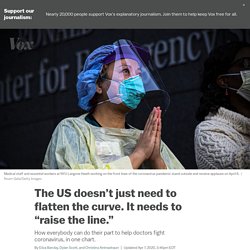
“This is going to be the hardest and the saddest week of most Americans’ lives, quite frankly,” US Surgeon General Jerome Adams said on Fox News Sunday. After failing to avert the Covid-19 crisis or offering a coherent response or plan to end it, the Trump administration is resigned to a prediction of 100,000 or more total deaths from the coronavirus. As of April 7, there were nearly 11,000 reported deaths nationwide, and many experts say that’s actually an undercount. A steep rise is now expected, particularly in hot spots like New York, New Jersey, Louisiana, and Michigan. Ruby Princess passengers allowed off ship after Border Force mistook negative flu tests for coronavirus results - ABC News. Ruby Princess coronavirus inquiry slams 'inexcusable' mistakes made by NSW Health - ABC News. Coronavirus: how to keep your gut microbiome healthy to fight COVID-19.
These are unprecedented times. COVID-19 (the illness caused by the new coronavirus SARS-CoV-2) has officially been declared a pandemic by the World Health Organization. Many countries have sealed their borders and put the population under voluntary or enforced lockdown. Cultural and sporting events have been cancelled or postponed – including Euro 2020 and the Glastonbury festival – pubs and restaurants are closing, and people are panic buying staples such as toilet paper and pasta. How to improve our relationship with nature after coronavirus. In the middle of the coronavirus crisis, many of us have turned to nature to reduce stress levels, improve mental health and stay physically active. Yet, human interaction with nature and ecosystems contributed to the existence of the current pandemic in the first place.
So what can we take away from this? Human action has altered our planet, from land to ocean, and has led to a loss of ecosystems. There is strong evidence that the emergence of zoonotic diseases – those that jump between animals – is linked to alteration of ecosystems and human encroachment into wildlife habitats, and the United Nations has recently linked environmental degradation to the emergence of pandemics. Melbourne has nothing to apologise for - we've just been unlucky. Yes, Melbourne has been showing signs of restriction fatigue, just like everywhere else. Yes, some people are showing little respect for the distancing rules. Show me a city or region where this is not the case. So why is it Melbourne then that is back in stage three lockdown. Eight big issues for vulnerable students highlighted by coronavirus crisis, charity says - ABC News. We Made the Coronavirus Epidemic. The latest scary new virus that has captured the world’s horrified attention, caused a lockdown of 56 million people in China, disrupted travel plans around the globe and sparked a run on medical masks from Wuhan, Hubei Province, to Bryan, Texas, is known provisionally as “nCoV-2019.”
It’s a clunky moniker for a lurid threat. The name, picked by the team of Chinese scientists who isolated and identified the virus, is short for “novel coronavirus of 2019.” It reflects the fact that the virus was first recognized to have infected humans late last year — in a seafood and live-animal market in Wuhan — and that it belongs to the coronavirus family, a notorious group. The SARS epidemic of 2002-3, which infected 8,098 people worldwide, killing 774 of them, was caused by a coronavirus, and so was the MERS outbreak that began on the Arabian Peninsula in 2012 and still lingers (2,494 people infected and 858 deaths as of November). One hundred days of the coronavirus crisis. Update: ‘A bit chaotic.’ Christening of new coronavirus and its disease name create confusion. *Update, 13 February, 12:15 p.m.: The story below, published on 12 February, has been updated with information from a WHO spokesperson. “COVID-19.
I’ll spell it: C-O-V-I-D hyphen one nine. COVID-19.” That’s how Tedros Adhanom Ghebreyesus, head of the World Health Organization (WHO), introduced the agency’s official name for the new disease that’s paralyzing China and threatening the rest of the world. The christening yesterday, at one of WHO’s now daily outbreak press conferences in Geneva, ended 6 weeks of uncertainty about what the disease would be called—but it also created some new confusion. COVID-19 is a name for the disease, not for the virus that causes it, which until now had a temporary moniker, 2019-nCoV, signifying it was a novel coronavirus that emerged last year.
Health security capacities in the context of COVID-19 outbreak: an analysis of International Health Regulations annual report data from 182 countries. Responding to Covid-19 — A Once-in-a-Century Pandemic? In any crisis, leaders have two equally important responsibilities: solve the immediate problem and keep it from happening again. COVID-19 and the anti-lessons of history. The pandemic as a war and Trump, the 'medic-in-chief' COVID-19 Superspreader Events in 28 Countries: Critical Patterns and Lessons. What would and should a post-pandemic world look like? 8 Pandemic Words & Phrases People Absolutely Never Want To Hear Again. Homemade hand sanitiser recipes that could help protect against coronavirus. To slow the spread of coronavirus we’re being told to wash our hands more, preferably with soap and water, or failing that, with hand sanitisers.
COVID-19 surveillance. Covid-19 (Coronavirus) Update: Chronology of a Pandemic. About a months since our last update, the world according to Covid-19 cases looks very different. The absolute number of accumulated cases has almost doubled to now more than 6.4 million and more than 382,000 have died (all figures last updated 04 June 2020). The trend that we identified at the beginning of May, with the USA as a constant epicentre, growing faster than any other country and South America (namely Brazil and Peru) and Russia closing in and Europe stagnating, hast been manifested.
Covid-19 vaccinations. Covid-19 WHO responses. Covid-19 government responses. Covid-19 and society impacts. Coronavirus updates. Covid-19 and economy. Special Issue : Air Pollution & COVID-19 Outbreak. The coronavirus crisis as tipping point: communicating the environment in a time of pandemic.
Climate change: Lockdown has 'negligible' effect on temperatures. First lockdown's effect on air pollution was overstated, our study reveals. Rod Oram: Nature is showing us the way. The Coronavirus Could Spark a Food Crisis. Here’s How to Stop It. The Guardian view on climate and Covid: time to make different choices. Pandemics, Climate Change, and Global Economics: Where Did We Go Wrong with Globalization?
Have stay-at-home orders really helped reduce air pollution? – wordpress.accuweather.com. 'Surprisingly rapid' rebound in carbon emissions post-lockdown. Coronavirus: Citizen science helps report ecosystem changes during the lockdown. Here's why you're craving the outdoors so much during the coronavirus lockdown. Environmental regulations likely to be first casualties in post-pandemic recovery. These 5 images show how air pollution changed over Australia’s major cities before and after lockdown. The Green Read: Are tiger traders cashing in on the coronavirus? Coronavirus distancing measures lifted as Cyclone Harold lashes Vanuatu.
Coronavirus Holds Key Lessons on How to Fight Climate Change. Delay is deadly: what Covid-19 tells us about tackling the climate crisis. Coronavirus pandemic leading to huge drop in air pollution. Emboldened wild animals venture into locked-down cities worldwide. Before-and-after photos that show reduced air pollution in India - Insider.
Peaks of Himalayas visible from parts of India for first time in decades as pollution drops amid lockdown - World News. 'Tip of the iceberg': is our destruction of nature responsible for Covid-19? Zagreb hit by earthquake while in coronavirus lockdown. Climate crisis: in coronavirus lockdown, nature bounces back – but for how long? 【无惧肺炎】武汉水上乐园万人空巷. Coronavirus. ANSA.it. News and current affairs from Germany and around the world. International - DER SPIEGEL. The news hub. Le Monde diplomatique - English edition. The Times Of India. The Hindu: Breaking News, India News, Sports News and Live Updates.
Coronavirus News Updates, Breaking News, Live News Online, Today Headline's. One COVID-19 positive infects 1.7 in India, lower than in hot zones. Coronavirus outbreak: Six more die in Maharashtra, Mumbai count up by 43. The COVID-19 crisis. Fierce rebuttals mark change to UK Covid-19 media strategy.
Harrowing images reveal fight for life in Sydney COVID hospital. Conservative Pastor Claims He 'Healed' Viewers of Coronavirus Through Their TV Screens. A FEW GOOD VICTORIANS. 22 Coronavirus Jokes to Retrain Your Face How to Smile. Simply 17 coronavirus jokes to help take the edge off (a little bit) The Poke. The Funniest Coronavirus Memes and Jokes. The Funniest Coronavirus Jokes To Lift Up Your Spirits During Self-Isolation (New Pics) "Stay The Fuck At Home" by Samuel L. Jackson.
Here's DJs Playing the Dan Andrews 'Get on the Beers' Remix at a WA Festival.